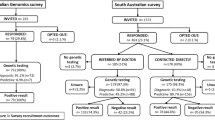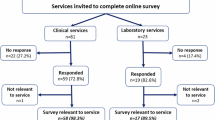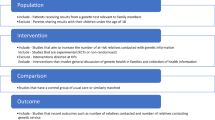Abstract
The aim of this study was to assess the quality of written information for patients and families about genetic testing, from a range of European countries. Written information relating to genetic testing for five conditions was gathered from genetic departments across seven European countries. Written information for each condition from each country was randomly chosen for assessment. Fourteen key issues had been identified by a number of pre-existing tools (in particular the DISCERN-Genetics tool) as being important for inclusion when developing or assessing material relating to genetic testing. Fifty pieces in total were assessed for the inclusion or omission of key issues. Although the majority of information discussed issues relating to the condition including background and effect (n=48, 96%), treatment and management (n=37, 74%) and heredity and risk (n=49, 98%), only half the information discussed where to obtain additional information and support (n=25, 50%). Less than half the information discussed what happens after the test (n=15, 30%), patient rights (n=12, 24%) and shared decision making (n=12, 24). Benefits were more likely to be included (n=41, 82%) than any risks involved (n=24, 48%). The issue discussed least frequently was the possible psychological and social effects of genetic testing (n=9, 18%). Pre-written leaflets tended to provide a more comprehensive discussion of the issues surrounding genetic testing than personal letters did and should therefore routinely be available to patients alongside personal letters. Written information should include risks and limitations of testing as well as discussion of the psychological and social aspects of genetic testing.
Similar content being viewed by others
Log in or create a free account to read this content
Gain free access to this article, as well as selected content from this journal and more on nature.com
or
References
Coulter AJ : Partnership with patients: the pros and cons of shared clinical decision making. Health Serv Res Policy 1997; 2: 112–121.
Gann B : Consumer health information in the year 2000. Association for Information Managers 1996; 48: 241–245.
European Opinion Research Group: European Union citizens and sources of information about health.2003 http://europa.eu.int/comm/health/ph_information/documents/eb_58_en.pdf.
Charnock D, Shepperd S, Needham G, Gann R : DISCERN: an instrument for judging the quality of written consumer health information on treatment choices. J Epidemiol Community Health 1999; 53: 105–111.
Meredith P, Emberton M, Wood C : New directions in information for patients. BMJ 1995; 311: 4–5.
Benigeri M, Pluye P : Shortcomings of health information on the internet. Health Promot Int 2003; 18: 381–386.
Skirton H, Eiser C : Discovering and addressing the client's lay construct of genetic disease: an important aspect of genetic healthcare? Res Theory Nurs Pract 2003; 17: 339–352.
Cullbertson V, Arthur T, Rhodes P, Rhodes R : Consumer preferences for verbal and written medication information. DICP 1998; 22: 390–396.
Mancini J, Nogues C, Adenis C et al: Impact of an information booklet on satisfaction and decision-making about BRCA genetic testing. Eur J Cancer 2006; 42: 871–881.
Baker D, Roberts D, Newcombe R, Fox K : Evaluation of drug information for cardiology patients. Br J Clin Pharmacol 1991; 31: 525–531.
Laine L, Shulman R, Bartholomew K, Gardner P, Reed T, Cole S : An educational booklet diminishes anxiety in parents whose children receive total parental nutrition. Am J Dis Child 1989; 143: 374–377.
Mancini J, Nogues C, Adenis C et al: Impact of an information booklet on satisfaction, and decision-making about BRCA genetic testing. Eur J Cancer 2006; 42: 871–881.
Cope C, Lyons A, Donovan V, Rylance M, Kilby M : Providing letters and audiotapes to supplement a prenatal diagnostic consultation: effects on later distress and recall. Prenat Diagn 2003; 23: 1060–1067.
Hargreaves K, Stewart R, Oliver S : Newborn screening information supports public health more than informed choice. Health Educ J 2005; 64: 110–119.
Thompson HS, Wahl E, Fatone A, Brown K, Kwate NO, Valdimarsdottir H : Enhancing the readability of materials describing genetic risk for breast cancer. Cancer Control 2004; 11: 245–253.
Cho MK, Arruda M, Holtzman NA : Education material about genetic tests; does it provide key information for patients and practitioners? Am J Med Genet 1997; 73: 314–320.
Cassiman J : Eurogentest – a European network of excellence aimed at harmonizing genetic testing services. Eur J Hum Genet 2005; 13: 1103–1105.
http://en.eurogentest.org/files/public/unit6/InterimReport.pdf p13.
Shepperd S, Farndon P, Grainge V et al: DISCERN-Genetics: quality criteria for information on genetic testing. Eur J Hum Genet 2006; 14: 1179–1188.
Wits-Douw M : Erfocentrum guidelines for developing and writing patient information on the website (www.erfelijkheid.nl).
Genetic Interest Group, Angelman Syndrome Support Group, Cri Du Syndrome Support Group publication: Your child has a genetic disorder: What do you need to know and from whom? (www.gig.org.uk).
Josephson U, Wickman M, Sandelin K : Initial experiences of women from hereditary breast cancer families after bilateral prophylactic mastectomy: a retrospective study. Eur J Surg Oncol 2000; 26: 351–356.
Donnai D : Genetic services. Clin Genet 2002; 61: 1–6.
Metcalfe K, Liede A, Trinkaus M, Hanna D, Narod SA : An evaluation of needs of female BRCA1 and BRCA2 carriers undergoing genetic counselling. J Med Gen 2000; 37: 866–874.
Eccles DM, Evans DG, Mackay J : Guidelines for a genetic risk based approach to advising women with a family history of breast cancer. J Med Genet 2000; 37: 203–209.
Gray J, Brain K, Norman P . et al: A model protocol evaluating the introduction of genetic assessment for women with a family history of breast cancer. J Med Genet 2000; 192–196.
Schneider KA : Genetic counselling for BRCA1/BRCA2 testing. Genet Test 1997; 1: 91–98.
Wonderling D, Hopwood P, Cull A et al: A descriptive study of UK cancer genetic services: an emerging clinical response to the new genetics. Br J Cancer 2001; 85: 166–170.
Hamilton RJ, Bowers BJ, Williams JK : Disclosing genetic test results to family members. J Nurs Scholarsh 2005; 37: 18–24.
Smith JA, Brewer HM, Eatough V, Stanley CA, Glendinning NW, Quarell OW : The personal experience of juvenile Huntington's disease: an interpretative phenomenological analysis of parents' accounts of the primary features of a rare genetic condition. Clin Genet 2006; 69: 486–496.
Arnold A, McEntagart M, Younger DS : Psychosocial issues that face patients with Charcot–Marie–Tooth disease; the role of genetic counselling. J Genet Couns 2005; 14: 307–318.
Skirton H : Parental experience of a pediatric genetic referral. Matern Child Nurs 2006; 31.
Bostrom K, Ahlstrom G : Living with a hereditary disease: persons with muscular dystrophy and their next of kin. Am J Med Genet 2005; 136: 17–24.
Fanos J, Johnson J : Perception of carrier status by cystic fibrosis siblings. Am J Hum Genet 1995; 57: 431–438.
James CA, Hadley DW, Holtzman NA, Winkelstein JA : How does the mode of inheritance of a genetic condition influence families? A study of guilt, blame, stigma, and understanding of inheritance and reproductive risks in families with x-linked and autosomal recessive diseases. Genet Med 2006; 8: 234–242.
Reid DT, Renwick RM : Relating familial stress to the psychosocial adjustment of adolescents with Duchenne muscular dystrophy. Int J Rehabil Res 2001; 24: 83–93.
Swillen A, Devriendt K, Legius E et al: The behavioural phenotype in velo-cardio-facial syndrome: from infancy to adolescence. Genet Couns 1999; 10: 79–88.
Prather P, de Vries PJ : Behavioral cognitive aspects of tuberous sclerosis complex. J Child Neurol 2004; 19: 666–674.
ISONG website: what is a genetic nurse? 3/11/03 http://www.isong.org/about/index.cfm.
NCHPEG website; core competences in genetics essential for all healthcare professionals http://www.nchpeg.org/core/Corecomps2005.pdf.
Genomics Policy Unit, University of Glamorgan and the Medical Genetics Service for Wales, University Hospital of Wales; Fit for Practice in the Genetics Era; Report to the Department of Health NHS Genetics Team December 2003, Core Standard Statement 5 www.glam.ac.uk/socschool/research/gpu/FinalReport.pdf.
Skirton S : Assessing the need for certainty in users of a clinical genetic health service. J Adv Nurs 2006; 55: 151–158.
Fulda K, Lykens K : Ethical issues in predictive genetic testing: a public health perspective. J Med Ethics 2006; 32: 143–147.
Meiser B, Mitchell PB, McGirr H et al: Implications of genetic risk information in families with a high density of bipolar. Soc Sci Med 2005; 60: 109–118.
McPherson E : Genetic diagnosis and testing in clinical practice. Clin Med Res 2006; 4: 123–129.
Thomas S : Society and ethics – the genetics of disease. Curr Opin Gen Dev 2004; 14: 87–91.
Stiratt G, Gill R : Autonomy in Medical Ethics after O'Niell. J Med Ethics 2005; 31: 127–130.
Mallardi V : The origin of informed consent. Acta Otorhinolaryngol Ital 2005; 25: 312–327.
Hopwood P, Howell A, Lalloo F, Evans G : Do women understand the odds? Risk perception and recall of risk information in women with a family history of breast cancer. Community Genet 2003; 6: 214–223.
Independent research conducted with the help of breakthrough breast Cancer.
March of Dimes: ‘Genetics and Your Practice – Benefits, Risks, Limitations of Genetic Testing’ http://www.marchofdimes.com/.
Author information
Authors and Affiliations
Corresponding author
Rights and permissions
About this article
Cite this article
Lewis, C., Mehta, P., Kent, A. et al. An assessment of written patient information provided at the genetic clinic and relating to genetic testing in seven European countries. Eur J Hum Genet 15, 1012–1022 (2007). https://doi.org/10.1038/sj.ejhg.5201874
Received:
Revised:
Accepted:
Published:
Issue date:
DOI: https://doi.org/10.1038/sj.ejhg.5201874
Keywords
This article is cited by
-
Developing patient-friendly genetic and genomic test reports: formats to promote patient engagement and understanding
Genome Medicine (2014)
-
From Constraints to Opportunities? Provision of Psychosocial Support in Portuguese Oncogenetic Counseling Services
Journal of Genetic Counseling (2013)
-
A whisper-game perspective on the family communication of DNA-test results: a retrospective study on the communication process of BRCA1/2-test results between proband and relatives
Familial Cancer (2011)
-
EuroGentest patient information leaflets: a free resource available in over 20 languages
European Journal of Human Genetics (2009)
-
EuroGentest
Medizinische Genetik (2008)



